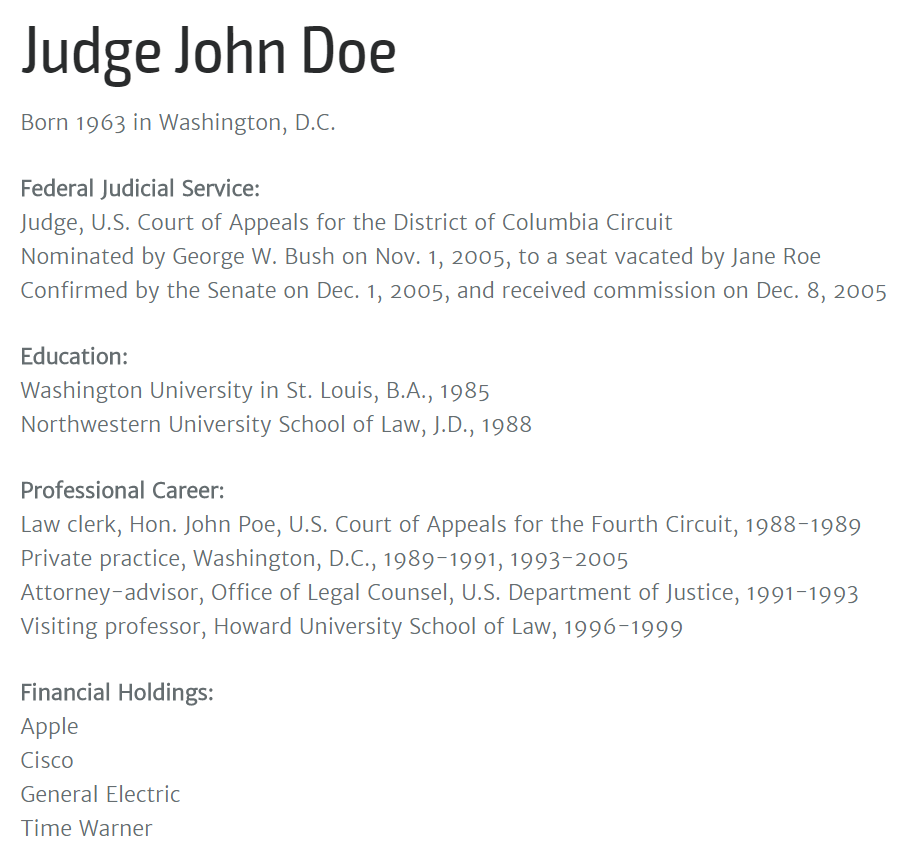Letter to Circuit Executives on Listing Judges' Stock Holdings
Dear Circuit Executive,
In honor of Sunshine Week 2018, I am requesting that all federal circuit courts list and periodically update their judges’ individually held stocks on each judge’s circuit-based webpage. (A PDF version of this letter is here.)
 For those circuits in which there is no judge-specific page, including those whose judges’ biography links redirect to the Federal Judicial Center website, I ask that you create such a page in the interest of transparency. I have generated an example at https://FixtTheCourt.com/SampleJudgePage and at right.
For those circuits in which there is no judge-specific page, including those whose judges’ biography links redirect to the Federal Judicial Center website, I ask that you create such a page in the interest of transparency. I have generated an example at https://FixtTheCourt.com/SampleJudgePage and at right.
Currently, if a concerned citizen wants to look up an appellate judge’s financial interests to check if the judge has a conflict in a case, he or she must file a request, via fax, with the Administrative Office of U.S. Courts in Washington, D.C., for the judge’s annual financial disclosure report and then wait an undetermined amount of time, usually several weeks, to obtain a copy.
Given that these reports are accurate as of December 31 of one calendar year but aren’t due to the AO until May 15 of the following year, and aren’t issued until mid-June at the earliest, they are at best five-and-a-half months out of date upon release. With judges permitted to request extensions, the information may be many months older than that.
To offer but one example, Third Circuit Judge Thomas Hardiman sold his Time Warner shares on Jan. 8, 2016, but didn’t file his 2016 disclosure until Nov. 16, 2017. It was finally released to the public on Dec. 28, 2017, a week-and-a-half shy of two years after his stock sale. By comparison, members of Congress and high-ranking executive and legislative branch officials are required by law to disclose their securities transactions within 45 days.
Though several other types of statutory conflicts are listed in the U.S. Code, I am not requesting that circuit courts catalogue, for instance, their judges’ family relations (due to privacy concerns) or their previous work (since this may be gleaned from PACER and Senate Judiciary Committee questionnaires) – only their individual stocks, which are the financial holdings most likely to yield a conflict.
Unfortunately, overlooked stock conflicts are not uncommon in the federal judiciary. A 2006 report by the Washington Post found that appellate judges ruled in at least seven 2003 suits in which “they or their spouses owned stock in a company involved in the case or had other financial ties to a party in the dispute.” Soon after this study came out, the Judicial Conference of the U.S. began requiring judges to employ conflict-check software to help them determine whether they should hear a case. Nevertheless, a 2014 Center for Public Integrity report found that two dozen appellate judges ruled on cases from 2010-2012 in which they had a stock conflict.
Fix the Court does not currently have the resources to conduct a more updated study but through conversations with federal judges and law clerks believes that listing conflict-inducing assets online would not be onerous for jurists. Nor do we believe would it be burdensome for circuit staff, as court websites are updated on a regular basis with new calendars, new suits, new audio files of hearings and, in many cases, new judges.
I firmly believe that the one branch of government seemingly above board these days should do all it can to stay that way, and I look forward to working with you to advance that mission.
Sincerely,
Gabe Roth
Fix the Court executive director